by Margaret Sgarra, contemporary art curator
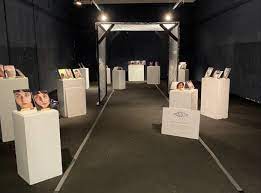 Veronica Bassani was born in Faenza and trained between her hometown Bologna, Milan, Rome and Ravenna. She is the artistic director of “Sorelle festival”, president of the cultural association “Fatti d’Arte” and curator. She deals with theatre, art and cultural events in Faenza, Bologna and Milan.
Veronica Bassani was born in Faenza and trained between her hometown Bologna, Milan, Rome and Ravenna. She is the artistic director of “Sorelle festival”, president of the cultural association “Fatti d’Arte” and curator. She deals with theatre, art and cultural events in Faenza, Bologna and Milan.
Now at its fourth edition, “Sorelle Festival” is proposed as a festival dedicated to the female figure which through a multidisciplinary approach investigates the woman role in relation to the past and present society. Can you tell us how this project started?
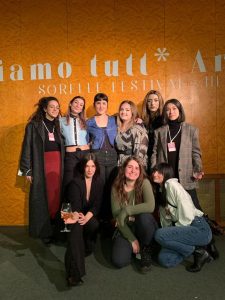 The project was born in 2019 while I was thinking about an artistic proposal requested by the CAV of Faenza – Sos Donna. I had been asked to speak about female empowerment and gender equality through culture. I have always believed that theater and all the arts are a powerful means of communication. So, talking with the operators of Sos Donna we decided to create an exhibition, which could deal precisely with the female figure, starting from the body. Woman’s body has always been subjected to violence by men, society and by women themselves. If we don’t defend our body first, and we don’t love it, unfortunately there will always be the risk of suffering violence. From this little reflection comes the idea of creating an artistic project speaking of love, sisterhood, support and the strength that the female universe hides. I discover the photographer Valentina Botta and her sorelle di corpo project,on Instagram, and I decide to offer her a personal exhibition in Faenza. I talk about it to the Municipality and I am offered the Palazzo delle Esposizioni. I think “ok great, but it’s wasted for just one exhibition … I could organize a festival!” I tell Valentina about the change of plans and she is enthusiastic about it. So I involve a master classmate of mine at the time, Angela Molari, who embraces the project and immediately becomes my right arm from the first edition on.
The project was born in 2019 while I was thinking about an artistic proposal requested by the CAV of Faenza – Sos Donna. I had been asked to speak about female empowerment and gender equality through culture. I have always believed that theater and all the arts are a powerful means of communication. So, talking with the operators of Sos Donna we decided to create an exhibition, which could deal precisely with the female figure, starting from the body. Woman’s body has always been subjected to violence by men, society and by women themselves. If we don’t defend our body first, and we don’t love it, unfortunately there will always be the risk of suffering violence. From this little reflection comes the idea of creating an artistic project speaking of love, sisterhood, support and the strength that the female universe hides. I discover the photographer Valentina Botta and her sorelle di corpo project,on Instagram, and I decide to offer her a personal exhibition in Faenza. I talk about it to the Municipality and I am offered the Palazzo delle Esposizioni. I think “ok great, but it’s wasted for just one exhibition … I could organize a festival!” I tell Valentina about the change of plans and she is enthusiastic about it. So I involve a master classmate of mine at the time, Angela Molari, who embraces the project and immediately becomes my right arm from the first edition on.
What was the happiest moment and the most complex one in creating this path?
I start from the more complex one because I still feel the sensation of March 8, 2020: the exhibitions were set up, the press conference held, the artists were in Faenza for the opening, 250 reservations waiting to access the event. The announcement of the blockade of all cultural and social events arrives. The opening skips. Angela, Valentina and I were inside the Palazzo delle Esposizioni, ready to open to the public. I don’t get discouraged and organize, thanks to the network of my association Fatti d’arte, a digital team that allows us to open with a live broadcast on multiple accounts (local newspapers, partner associations and artists) and thus we inaugurate digitally and remotely. So through a non-obvious approach for the pre pandemic. I think this was the hardest moment ever, but thanks to the super team of the association we managed to transform it into a beautiful memory, giving the possibility from the first days of the lockdown to be able to see the exhibition from home at 360: https: //www.fattidarteassociazione.it/sorelle-di-corpo360/.
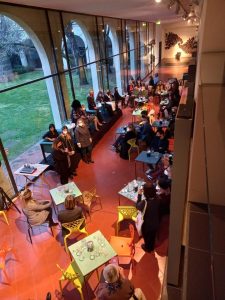 Instead, I think the happiest moment was in 2022 when for the first time and albeit with masks, we managed to open the festival in person. Because unfortunately the 2021 edition also happened during the restriction of the red zones. So seeing people again, sensing the desire to be there, participate, to see the artwork closely, talk to the artists and create a debate together that is no longer virtual but alive and present, this moved me. Not to mention the fact that the festival, despite the fact that the world remained immobilized, had grown and made itself known in the area. Indeed, since last year during the third edition, we have chosen to work in all the surrounding municipalities, involving 6 of them at the same time, with incredible locations and with young female artists from different areas of Italy.
Instead, I think the happiest moment was in 2022 when for the first time and albeit with masks, we managed to open the festival in person. Because unfortunately the 2021 edition also happened during the restriction of the red zones. So seeing people again, sensing the desire to be there, participate, to see the artwork closely, talk to the artists and create a debate together that is no longer virtual but alive and present, this moved me. Not to mention the fact that the festival, despite the fact that the world remained immobilized, had grown and made itself known in the area. Indeed, since last year during the third edition, we have chosen to work in all the surrounding municipalities, involving 6 of them at the same time, with incredible locations and with young female artists from different areas of Italy.
Among the various disciplines investigated in the festival we also find photography. In fact, the solo exhibition “Sorelle di corpo” by Valentina Valuh Botta aims to raise consciousness on the theme of the body by launching a positive message based on awareness and individual acceptance. Can you tell us how you met?
Valentina, as mentioned at the beginning, was my starting point. I think that her project “Sorelle di corpo” was calling me. How we met is very funny. I was in Copenhagen for an Erasmus+ and I was looking for new projects. A friend told me about her project, which had just been published in Vogue Italia. As I saw her shots on Instagram, the video and her mission, it was immediately alchemy. Valentina accepted my invitation to bring a selection of her shots to Faenza and create a solo show curated by me and Angela Molari, with comics by Andrea Zoli. In fact we had thought of creating a path for schools, given that such a delicate type of subject often affects precisely that age group. Unfortunately as we know 2020 was a very hard time for culture, but this difficulty led us to support each other and create a deep connection between us and our projects.
Another exhibition project is the personal exhibition of Rosita D’Agrosa entitled “Indecisi tra la speranza e la paura” curated by Erica Romano. Through her works, the artist tells us about corporality, women and change. Is there a kind of feminist art in your opinion?
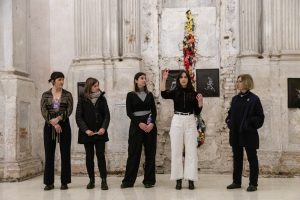 In my opinion yes, or better, art speaks to us of what male artists and female artists want to convey. Rosita is certainly an artist who communicates her poetics very clearly. When the public entered the Fontanone, they wanted to know more about this delicate and at the same time strong artist. Even the journalist who came to cover the news told us that Rosita’s clear and undisputed way of communicating had captured her, asking us for the catalogue of her works. But without changing the subject, I believe that we are in an era of great cultural ferment and rediscovery of the female world, perhaps because it has never been studied in such an important way up to now. So I think it also happens to female artists and festivals like ours. We are daughters of our time and we talk about what we feel the need to.
In my opinion yes, or better, art speaks to us of what male artists and female artists want to convey. Rosita is certainly an artist who communicates her poetics very clearly. When the public entered the Fontanone, they wanted to know more about this delicate and at the same time strong artist. Even the journalist who came to cover the news told us that Rosita’s clear and undisputed way of communicating had captured her, asking us for the catalogue of her works. But without changing the subject, I believe that we are in an era of great cultural ferment and rediscovery of the female world, perhaps because it has never been studied in such an important way up to now. So I think it also happens to female artists and festivals like ours. We are daughters of our time and we talk about what we feel the need to.
What advice would you give to those who want to pursue a career as an artist and what do you think of art today?
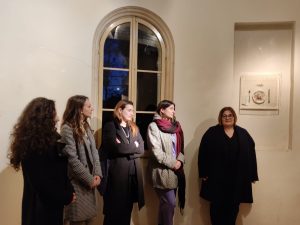 My advice is to work online: let’s connect and enrich ourselves. I believe that being an artist today, but perhaps in all ages, is not easy at all. Indeed, let’s face it, it is extremely difficult. We are in a society that does not support artists. We are in the era of results, profit and of the everything and immediately and this does not go along with the creative processes, which are sometimes love at first sight, but other times they are long and require a lot of artistic research. Fortunately, there are many cultural realities that address these needs and try to facilitate creative work by proposing tenders, artistic residencies, exchanges and shared planning. So my advice is to get to know each other well, understand what we want to do and find your allies. In fact, together we can create a strong cultural ecosystem. This allows us to grow and make a “career” also in the world of art and culture, which I believe is one of the most difficult ever since there is no predefined path to follow.
My advice is to work online: let’s connect and enrich ourselves. I believe that being an artist today, but perhaps in all ages, is not easy at all. Indeed, let’s face it, it is extremely difficult. We are in a society that does not support artists. We are in the era of results, profit and of the everything and immediately and this does not go along with the creative processes, which are sometimes love at first sight, but other times they are long and require a lot of artistic research. Fortunately, there are many cultural realities that address these needs and try to facilitate creative work by proposing tenders, artistic residencies, exchanges and shared planning. So my advice is to get to know each other well, understand what we want to do and find your allies. In fact, together we can create a strong cultural ecosystem. This allows us to grow and make a “career” also in the world of art and culture, which I believe is one of the most difficult ever since there is no predefined path to follow.
What is the aspect you love most about your job?
Getting to know people, places, worlds. As difficult as it is sometimes to figure out how to do it, I don’t think I would change my job for anything in the world. It allows you to grow, enrich yourself and evolve with each project.
What are your next projects?
Soon I will leave for Oslo for a European project on sustainable creativity. In the meantime, I will start working on the Ina casa Aidoru association project.